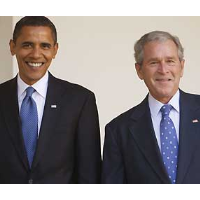Objections to Presidential Signing Statements Fall Victim to Partisan Politics

Barack Obama, the former constitutional law professor and U.S. senator, once disapproved of presidential signing statements, which allow the White House to ignore or interpret differently certain provisions of new laws passed by Congress. But Obama the 44th president of the United States has often embraced the practice that he once called a “clear abuse” of executive power.
Like so many other things in Washington, DC, these days, partisanship has been blamed for Obama’s flip on the subject.
“I will not use signing statements to nullify or undermine congressional instructions as enacted into law,” Obama told the Boston Globe back in 2007.
Obama was just one of the many critics of President George W. Bush’s prolific habit of employing signing statements, which totaled twice as many as all of his predecessors combined (1,200 provisions in 172 laws signed by Bush were contested).
“The problem with this administration is that it has attached signing statements to legislation in an effort to change the meaning of the legislation, to avoid enforcing certain provisions of the legislation that the president does not like, and to raise implausible or dubious constitutional objections to the legislation,” Obama added in his response to the newspaper.
To date, Obama has issued nearly 30 signing statements of his own.
Early last year, after Congress approved the 2013 Defense Authorization Act (pdf), the president challenged more than 20 sections of the law. At the end of the year he also challenged a section of the 2014 Defense Authorization Act (pdf) that required the administration (specifically the defense secretary) to notify Capitol Hill 30 days in advance of plans to relocate detainees held at Guantánamo Bay.
When the administration shipped five Taliban members from Guantanamo to Qatar as part of the deal to free POW Bowe Bergdahl, the Pentagon avoided telling Congress in advance (instead, lawmakers got their notice two days after the fact).
The White House said its actions were consistent with what Obama said last year in his signing statement, that the provision in the defense bill potentially interfered with the executive branch’s power to conduct foreign policy.
Another way to look at it is that the Democratic president, who has enjoyed little in the way of bipartisan support from Republicans in the House and Senate, was not about to treat GOP lawmakers as equal partners by adhering to their notification demand.
“When Bush was issuing signing statements, the Republicans didn’t care. When Obama was doing it, Democrats didn’t care,” Bruce Fein, a lawyer with the American Bar Association and a member of its 2006 panel that rebuked Bush for his frequent use of signing statements. “And that is how power accrues to the president.”
-Noel Brinkerhoff
To Learn More:
Obama Circumvents Laws with ‘Signing Statements,’ a Tool He Promised to Use Lightly. (by Karen Tumulty, Washington Post)
Obama Threat to Whistleblower Protections Triggers Alarm in Congress (by Noel Brinkerhoff, AllGov)
Obama Signing Statement Says He isn’t Bound by 20 Provisions of General Spending Bill (by David Wallechinsky and Noel Brinkerhoff, AllGov)
- Top Stories
- Unusual News
- Where is the Money Going?
- Controversies
- U.S. and the World
- Appointments and Resignations
- Latest News
- Trump to Stop Deportations If…
- Trump Denounces World Series
- What If China Invaded the United States?
- Donald Trump Has a Mental Health Problem and It Has a Name
- Trump Goes on Renaming Frenzy






Comments